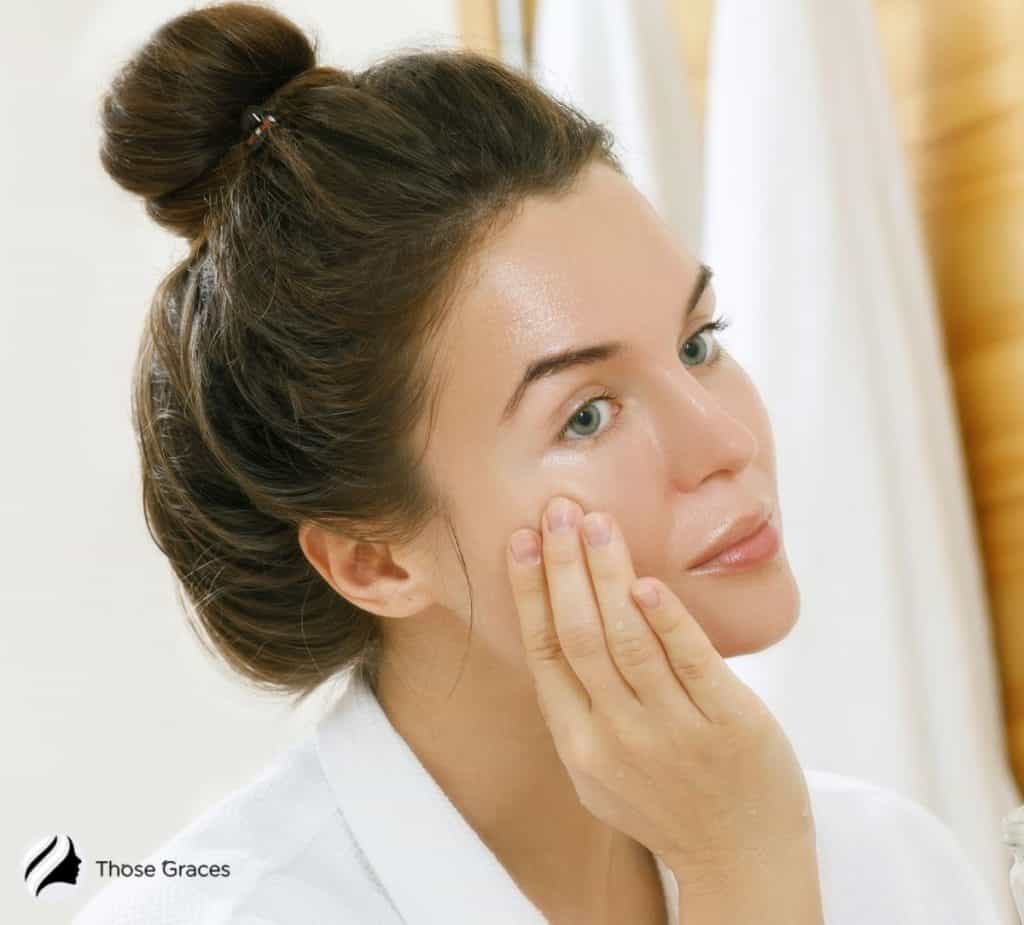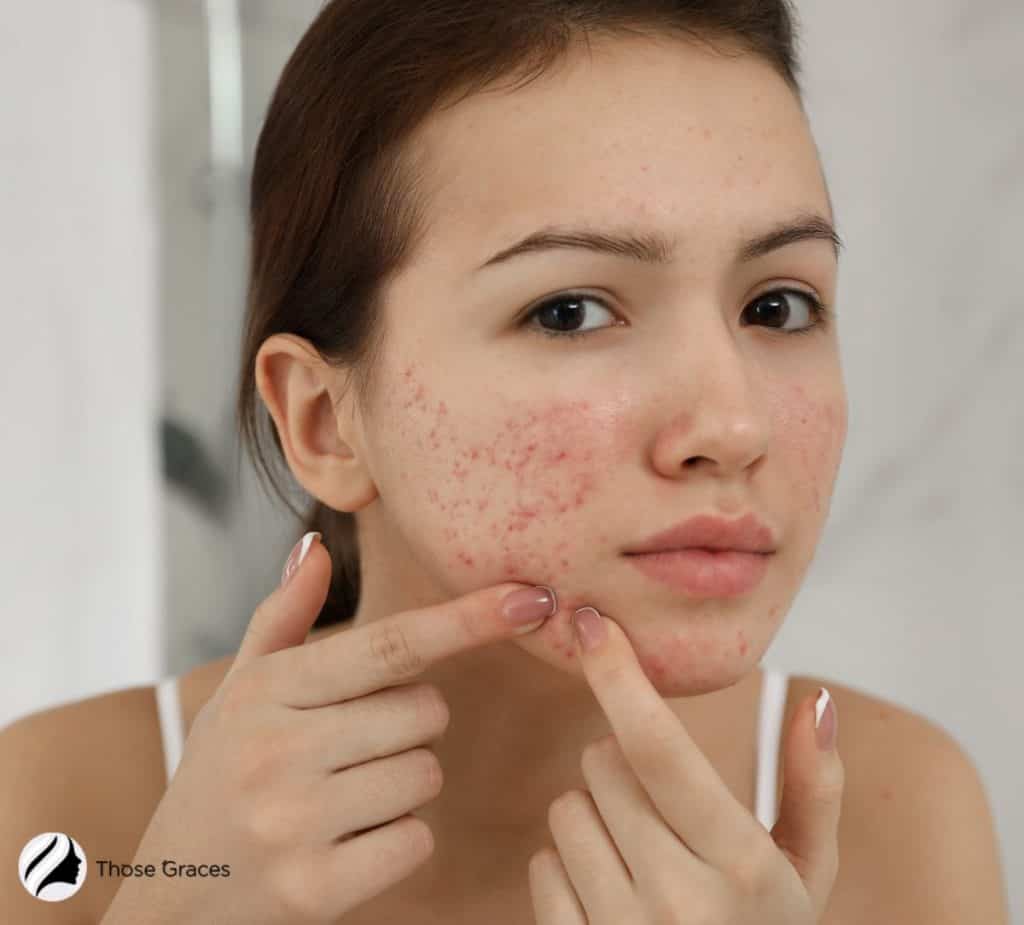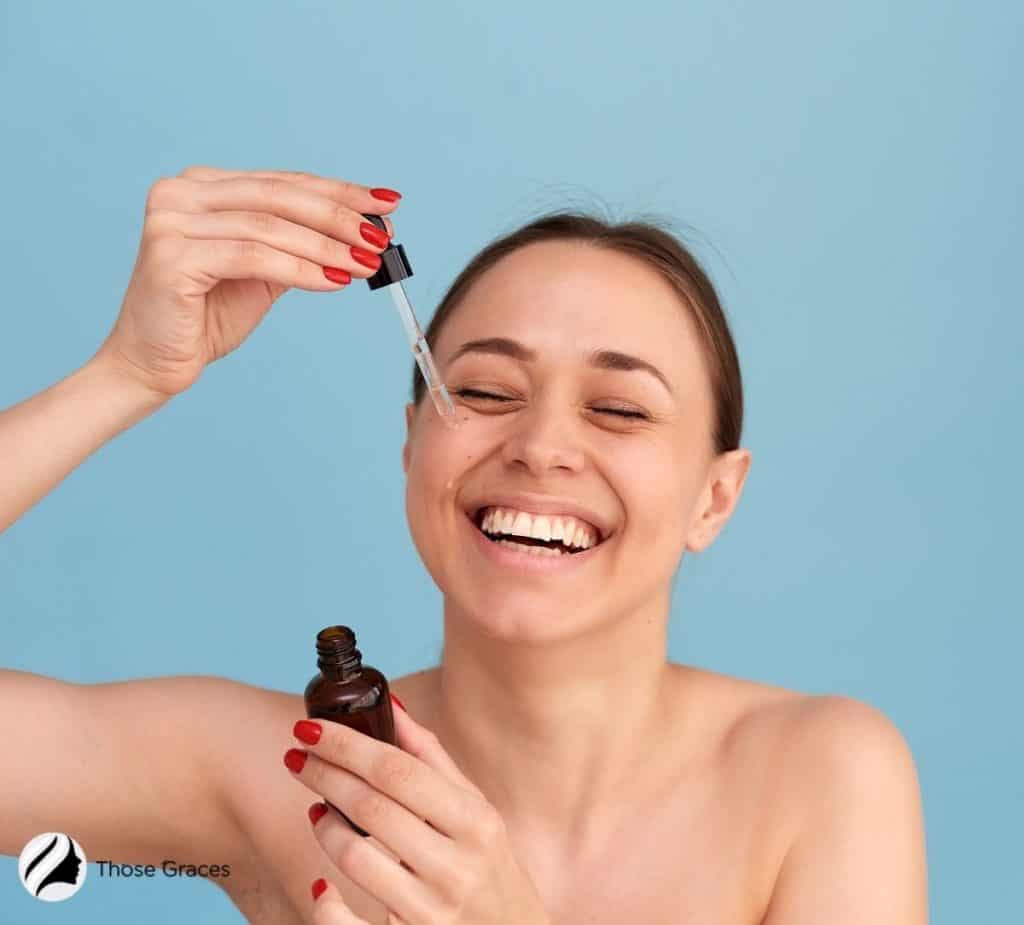The beauty world is abuzz, and Hyaluronic Acid is the name on everyone’s lips. Wondering why?
Recent studies describe this acid’s potential for oily skin to “promote skin glow” and “reduce wrinkles,” – and as someone with bad skin, I’ve used this acid myself, and the result was astonishing!
In this article, you’ll learn about the magic of hyaluronic acid, its benefits, potential risks, and how to use it optimally on your skin – it’s super easy!
Keep reading to unravel the beauty of hyaluronic acid for oily skin and why experts are HOOKED [1]!
Table of Contents
Key Takeaways
- Hyaluronic Acid (HA) Balances Oily Skin: HA provides deep hydration, regulating oil production and reducing chances of acne breakouts.
- HA Fights Signs of Aging: By promoting collagen synthesis, HA smoothens fine lines, offering a more youthful skin appearance.
- HA’s Healing Properties: Beyond cosmetic allure, HA aids in wound healing and reduces inflammation, which is crucial for post-skin procedures.
Hyaluronic Acid: A Secret Weapon Against Oily Skin
Hyaluronic Acid (HA) is a powerhouse ingredient that excels in balancing oily skin, moisturizing dry areas, reducing the appearance of fine lines, and even facilitating wound healing.
Its diverse benefits make it indispensable for various skin types and concerns.
Here’s a closer look at what makes this component a skincare staple.
1. Master of Balance: Oily Skin’s Best Friend
More often than not, having oily skin hints at underlying dehydration. While the surface might seem oily, deep down, it’s thirsty for hydration.
Hyaluronic Acid addresses this by regulating the skin’s natural oils, hydrating where essential without adding to the oiliness. The results?
- Fewer dry patches amidst the oiliness for combination skin.
- Decreased breakout chances for those prone to acne.
“Hyaluronic acid helps skin stretch and flex and reduces skin wrinkles and lines,” states the Cleveland Clinic, emphasizing its importance in skin health [2].
2. The Fountain of Youthfulness
Aging is natural, but signs like wrinkles and fine lines can be managed. Say hello to Hyaluronic Acid and a common query: “Can you use hyaluronic acid and vitamin C serum together?”
Hyaluronic Acid (HA) offers numerous benefits:
- It promotes collagen synthesis, the protein responsible for skin elasticity.
- By retaining moisture, HA smoothens fine lines, contributing to a more youthful look on the skin.
When combined with vitamin C serum, the duo can work harmoniously to enhance the skin’s appearance and protection. Just ensure to layer them correctly and always do a patch test when introducing new products.
3. Beyond Beauty: The Healing Phenomenon
Beauty isn’t just skin deep, and neither are Hyaluronic Acid’s benefits:
- It modulates inflammation, which is crucial in the wound-healing process.
- It enables the body to produce more blood vessels, accordingly hastening recovery, especially after skin procedures.
The Science Behind Oily Skin
Many people experience oily skin primarily due to overactive sebaceous glands (glands responsible for producing oil).

These glands produce the natural oils our bodies require to keep our skin hydrated and healthy.
Nevertheless, when these glands become hyperactive, they can produce excess oil, resulting in oily skin types.
The surplus oil on your skin’s surface may make it appear shiny, greasy, or murky.
Several factors contribute to this excessive activity, including:
- Heredity
- Hormonal changes (puberty or pregnancy)
- Stress levels
- Environmental conditions (humidity)
Excess natural oils on the skin can lead to blocked pores, a common cause of acne-prone complexions.
The Link Between Oily Skin and Acne
If you have an oily complexion, chances are higher that you might develop acne or pimple breakouts. Why’s that?
When your skin becomes too oily, your pores – in response – can become blocked.

To fight this, use a good skincare routine. In fact, by using appropriate products, you’ll prevent oil accumulation and, in addition, hydrate your skin.
Let’s delve into why hyaluronic acid acts beneficially against controlling oiliness while promoting healthier dermal layers underneath.
Exploring Natural Alternatives to Hyaluronic Acid
Using hyaluronic acid, managing oily skin, and keeping it hydrated is possible – but are there alternatives? If so, are they natural?
You bet! Here they are…
1. Vitamin E
For those looking to explore natural alternatives with similar benefits, vitamin E stands out as a strong contender.
This antioxidant powerhouse protects your skin from environmental damage while maintaining moisture levels.
It also plays an essential role in wound healing and reducing inflammation, particularly beneficial for those with acne-prone skin.
2. Glycerin: Nature’s Humectant
Derived from plants, glycerin is another natural substance that closely mimics hyaluronic acid’s moisturizing capabilities.
As a humectant, glycerin attracts water to the skin, ensuring it remains plump and hydrated. It’s a frequent flier in many skincare products for a reason.
The more hydrated the skin, the more resilient it is against potential irritants and signs of aging.
3. Honey: Sweet Elixir for Skin
Since ancient times, honey has been revered for its skin-nourishing properties.
It is a natural humectant, attracting and retaining moisture, and it also comes packed with antioxidants. These antioxidants fight off free radicals, delaying the skin aging process.
Moreover, its natural antibacterial properties make it a boon for those struggling with acne.
Building Your Ideal Skincare Routine

A Consistent Approach Is a Key
Achieving optimal results requires more than selecting high-quality items; consistency is also crucial.
Regular application of sunscreen, gentle cleansing, and exfoliation all contribute to a glowing complexion over time.
Timing Matters Too
Knowing when exactly to apply certain items during your daily routines matters greatly. For example, using antioxidants like vitamins C and E in the morning is ideal.
In contrast, nighttime is better suited for heavier moisturizers and retinol-based creams due to slower metabolic rates at night, allowing for longer absorption.
Beta Glucan – An All-Rounder for Skincare
As we explore the vast skincare world, beta-glucan emerges as a powerful ally.
This polysaccharide is derived from natural sources such as yeast and oats and caters to all skin types with its deep penetrating abilities.
The beauty of this ingredient lies in its multifunctional approach to enhancing your skin’s health and nourishment.
It delivers hydration at multiple levels, reduces wrinkles, improves elasticity, stimulates collagen production, and aids wound healing. It truly embodies an ‘all-rounder’ status.
Unleashing the Power of Beta Glucan Creams
A closer look into beta glucan creams reveals their potential beyond moisturizing skin.
A thin layer is formed on the surface of your skin to lock in moisture without blocking pores or leaving behind an oily residue – a beneficial outcome, especially for those dealing with acne-prone and delicate skin.
In addition, glucans come armed with immune-enhancing effects.
What’s great, these effects boost your body’s defense mechanisms against harmful bacteria, and, as a result, prevent common skincare problems like inflammation.
For a holistic review, click on this video & learn more about beta glucan!
Combining hyaluronic acid and beta-glucan offers a powerful solution for achieving healthy skin.
These two ingredients work together, delivering comprehensive skincare benefits beyond managing oily skin or providing hydration.
By acting as a moisture magnet, Hyaluronic acid draws water from the dermis and atmosphere to maintain your skin’s hydration.
In addition, Beta-glucan enhances these effects by improving your skin’s ability to retain moisture and fortifying its natural defense mechanisms against environmental stressors.
A Dynamic Duo: The Benefits of Combining Hyaluronic Acid and Beta Glucan
This potent pair addresses multiple everyday skincare concerns simultaneously:

- Hydration: Both hyaluronic acid serums and beta-glucans are renowned for their impressive hydrating properties, which help maintain optimal hydration levels across all skin types, including dry, sensitive, or acne-prone skin.
- Skin Elasticity: By stimulating collagen production, an essential protein responsible for maintaining our skin’s elasticity, they aid in reducing signs of aging, such as fine lines and wrinkles, promoting a youthful, glowing complexion.
FAQs
Is hyaluronic acid good for oily skin?
Can hyaluronic acid cause oiliness?
Is vitamin C or hyaluronic acid better for oily skin?
How do you use hyaluronic acid for oily acne-prone skin?
Conclusion
Understanding the science behind Hyaluronic acid for oily skin is key to finding practical solutions.
Factors – whether biological (stress, hormonal changes) or environmental (temperature, humidity) – can enhance oily skin’s negative impact on your life.
The consequences of excess oil production are far from trivial. It’s not just about having a glossy look; it can cause congested pores, spots, and acne.
Hyaluronic acid emerges as a promising solution for oily skin. Its ability to decrease sebum production while retaining moisture in the skin makes it an attractive option.
If you want optimal skincare results, consider combining hyaluronic acid with beta glucan creams!
Resources
1. Morris T. Is Hyaluronic Acid Good for Oily Skin? [Internet]. betterwayhealth. 2023 [cited 2023 Aug 21]. Available from: https://www.betterwayhealth.com/is-hyaluronic-acid-good-for-oily-skin
2. Hyaluronic Acid: What It Is, Benefits, How To Use & Side Effects [Internet]. Cleveland Clinic. 2022. Available from: https://my.clevelandclinic.org/health/articles/22915-hyaluronic-acid


